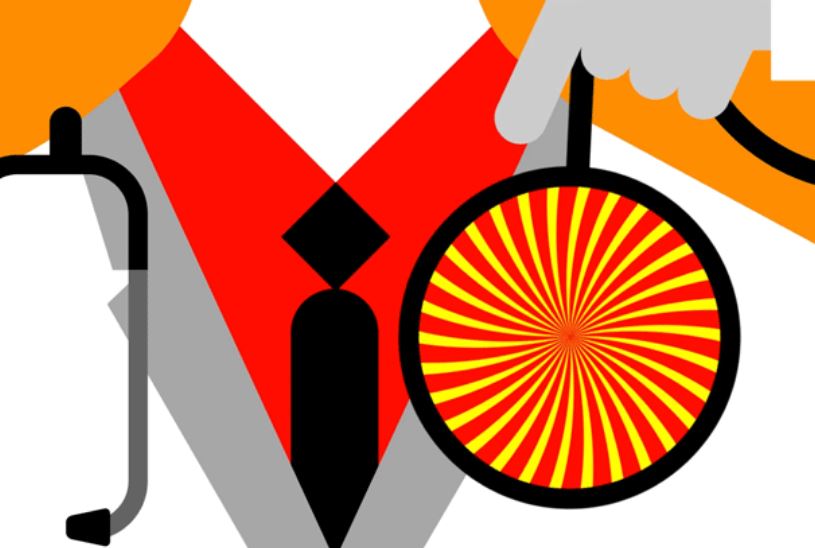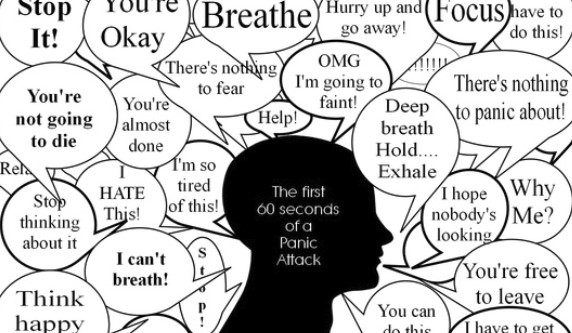
 Major hospitals are finding hypnotherapy can help sufferers of digestive conditions like heartburn, colitis, acid reflux and irritable bowel syndrome.
Major hospitals are finding hypnotherapy can help sufferers of digestive conditions like heartburn, colitis, acid reflux and irritable bowel syndrome.
Sarah Blau settles into a wicker chair, stretching her feet onto an ottoman. In a soothing voice, Laurie Keefer, says, “I’m going to count from one to three, and as I count, your eyelids will get heavy and they’ll close whenever it feels right.”
Dr. Keefer, a health psychologist at Mount Sinai Health System, has Ms. Blau progressively relax each part of her body and guides her to “a place of rest and comfort and healing.” “Enjoy the beauty of this natural, healing place,” she tells her, “and as you do, something very powerful and healthy and positive is taking place deep inside your body. Your body knows what it needs to maintain healing your gut. It knows how to keep pleasant sensations in and avoid pain and discomfort.”
Hypnotherapy—when patients enter a trance-like state using relaxation and visual images—is often associated with alternative medicine. But increasingly medical centers are using it to treat digestive conditions like acid reflux, irritable bowel syndrome and ulcerative colitis, a disease Ms. Blau learned she had in 2016.
Studies have shown hypnotherapy is effective reducing symptoms associated with these gastrointestinal disorders. Insurance companies usually cover the treatments. The body of evidence is strongest for IBS, but a 2013 study found hypnotherapy was effective at prolonging remission in colitis patients. And a 2016 pilot study found patients with functional heartburn reported fewer symptoms.
Dr. Keefer works at the Susan and Leonard Feinstein Inflammatory Bowel Disease Clinical Center at Mount Sinai. There she does hypnotherapy for patients with Crohn’s disease and ulcerative colitis, diseases caused by inflammation of the intestines.
The treatment usually consists of about seven sessions over three months, with home practice in between. Studies have found the effects can last more than a year and work in more than half of patients.
In addition to Mount Sinai, hypnosis for patients with digestive conditions is available at University of Michigan, Beth Israel Deaconess Medical Center in Boston, University of Washington in Seattle, Baylor College of Medicine in Houston and Loyola University Medical Center and Northwestern Memorial Hospital in the Chicago area. Mayo Clinic in Rochester, Minn., also is exploring adding hypnotherapy for IBS patients.
Laurie Keefer, a health psychologist at Mount Sinai Health System, conducts hypnotherapy research and treatments on patients with inflammatory bowel disease. There is a three-to-six-month wait list for the treatment.
Some patients get a little uneasy about the word ‘hypnosis,’ ” says Andrea Bradford, an assistant professor of medicine at Baylor, which started offering the treatment in 2016. “It conjures up images of some guy in Vegas making you bark like a dog. It takes some education to explain to them what it constitutes and what it does not.” She says about one-third of patients are open to it.
Experts theorize that hypnotherapy works because many gastrointestinal disorders are affected by a faulty connection between the brain and the gut, or digestive tract. The gut and brain are in constant communication. When something disrupts that communication, the brain misinterprets normal signals, which can cause the body to become hypersensitive to stimuli detected by nerves in the gut, causing pain. Experts believe hypnosis shifts the brain’s attention away from those stimuli by providing healthy suggestions about what’s going on in the gut.
 “It doesn’t get rid of the stimulus. Your GI tract is still moving. It’s just changing the threshold of perception so you’re not paying attention or feeling it with the same intensity,” says John Pandolfino, chief of gastroenterology and hepatology at Northwestern, which started offering hypnotherapy in 2006 and has plans to expand to two regional hospitals. Northwestern has trained health psychologists in GI disorders who have moved on to start programs at other academic centers.
“It doesn’t get rid of the stimulus. Your GI tract is still moving. It’s just changing the threshold of perception so you’re not paying attention or feeling it with the same intensity,” says John Pandolfino, chief of gastroenterology and hepatology at Northwestern, which started offering hypnotherapy in 2006 and has plans to expand to two regional hospitals. Northwestern has trained health psychologists in GI disorders who have moved on to start programs at other academic centers.
Sarah Quinton, a gastrointestinal psychologist at Northwestern, is part of a team that conducts hypnotherapy treatments, along with two other psychologists and students in training. . They plan to expand treatments two local hospital due to patient demand and success rates.
Because there aren’t many treatments for IBS, hypnotherapy has become “the front-line therapy,” Dr. Pandolfino says. Dr. Pandolfino says he will take patients with reflux problems whose symptoms aren’t improving off their medication. After that, if their acid levels are normal but they still experience symptoms, like chest pain, he recommends hypnotherapy. This happens with “a large number of patients,” Dr. Pandolofino says.
David Dewey, a 58-year-old real-estate developer in the Chicago suburbs, says hypnotherapy helped rid him of abdominal pain that sometimes kept him up at night. His doctor at Northwestern told him that his diagnosis of IBS was incorrect and that the real problem was related to his brain.
His doctor said, he recalls, “It sounds crazy, but we’ve been having great success with hypnotherapy.” He figured he had nothing to lose, since nothing else had helped for two years. The pain disappeared in under 10 sessions. “Sometimes it creeps back a little, and I just do one or two [home] sessions and it goes away,” Mr. Dewey says.
Olafur Palsson, a professor of medicine and clinical psychologist at the University of North Carolina at Chapel Hill, developed the first script, or protocol, for hypnosis treatment for IBS in 1995. The script has been  adapted for use in other GI disorders.
adapted for use in other GI disorders.
He has trained hundreds of therapists in the protocol, which he says 600 therapists across the country use today. Most professionals who conduct hypnotherapy treatments are psychologists. Shoba Krishnamurthy, a gastroenterologist at the University of Washington, got training and decided to incorporate it into her practice about three years ago.
“It’s mostly for patients who have had a work-up but we haven’t found anything abnormal in tests, so there is not a specific abnormality to treat,” she says. Ms. Blau, a 32-year-old who has been undergoing hypnotherapy at Mount Sinai, began the treatments in the fall, when her colitis was under control, as a preventive measure. It has remained that way. “I’ve been feeling really good,” she says.
By: Sumathi Reddy

 Can Weight Loss Be Achieved Through Hypnotherapy? Many of us struggle to lose weight through traditional dieting, but could hypnotherapy for weight loss provide the solution we’re looking for?
Can Weight Loss Be Achieved Through Hypnotherapy? Many of us struggle to lose weight through traditional dieting, but could hypnotherapy for weight loss provide the solution we’re looking for?
We all know that being overweight can be bad for your health, increasing the risk of serious conditions such as Type 2 Diabetes, cancer, stroke and cardiovascular disease, but, as the statistics show, losing weight isn’t always as easy as it sounds. So, what are our options when traditional dieting lets us down?
For a growing number of people, the answer lies in a slightly unconventional but increasingly popular dieting method – hypnotherapy for weight loss. But what exactly is hypnotherapy for weight loss, and does it actually work?
Mind over matter
The human brain is a powerful tool, and weight loss hypnotherapy aims to harness this power to help clients to think themselves thin and achieve meaningful and long-lasting weight loss.
The treatment centers around visualization – a process that is proven to have a noticeable physical impact on the body. For example, when we think about  something upsetting or stressful, our bodies release adrenaline and tense up, whereas, if we visualize a pleasant and relaxing scenario, we find that our muscles relax automatically.
something upsetting or stressful, our bodies release adrenaline and tense up, whereas, if we visualize a pleasant and relaxing scenario, we find that our muscles relax automatically.
With hypnotherapy for weight loss, clients are walked through a number of visualization techniques, which can help to re-calibrate the signals that control digestion and feelings of fullness.
The treatment culminates with clients being taken through the visualization process of getting a gastric band fitted – offering them the benefits of surgery without going under the knife.
Tackling the root causes
However, hypnotherapy for weight loss involves a lot more than just visualization techniques. There can be many complex issues underlying a person’s weight gain, and it is these issues that weight loss hypnosis aims to identify and resolve.
By combining traditional hypnotherapy with Cognitive Behavior Therapy, Neurolinguistic Programming, and other recognized counselling techniques, therapists are able to tackle the root cause of the problem, supporting clients to retrain their cognitive thinking and develop a healthier relationship with food and eating.
 Long-term lifestyle change
Long-term lifestyle change
What makes weight loss hypnotherapy so effective is that it takes a holistic approach, targeting a long-term lifestyle change rather than a short-term weight loss that is impossible to maintain for any significant length of time.
Weight problems are treated as a psychological rather than solely physical issue and, when combined with follow-up diet and nutrition advice, this empowers clients to make permanent, healthy changes to their lifestyle and achieve their weight-loss goals.
A safe solution
As with any diet, the amount of weight lost will vary from person to person, but research has shown that weight loss hypnotherapy can be a hugely effective treatment, with some clients reporting losses of 100 pounds, while others have lost over half of their body weight!
If you’re struggling to lose weight and are looking for a safe and effective alternative to gastric band surgery, hypnotherapy for weight loss could be the solution you’re looking for.
By: Women Fitness Magazine

 By scanning the brains of subjects while they were hypnotized, researchers at the School of Medicine were able to see the neural changes associated with hypnosis. Stanford researchers found changes in three areas of the brain that occur when people are hypnotized.
By scanning the brains of subjects while they were hypnotized, researchers at the School of Medicine were able to see the neural changes associated with hypnosis. Stanford researchers found changes in three areas of the brain that occur when people are hypnotized.
Your eyelids are getting heavy, your arms are going limp and you feel like you’re floating through space. The power of hypnosis to alter your mind and body like this is all thanks to changes in a few specific areas of the brain, researchers at the Stanford University School of Medicine have discovered.
The scientists scanned the brains of 57 people during guided hypnosis sessions similar to those that might be used clinically to treat anxiety, pain or trauma. Distinct sections of the brain have altered activity and connectivity while someone is hypnotized, they report in a study published online July 28 in Cerebral Cortex.
“Now that we know which brain regions are involved, we may be able to use this knowledge to alter someone’s capacity to be hypnotized or the effectiveness of hypnosis for problems like pain control,” said the study’s senior author, David Spiegel, MD, professor and associate chair of psychiatry and behavioral sciences.
A serious science
For some people, hypnosis is associated with loss of control or stage tricks. But doctors like Spiegel know it to be a serious science, revealing the brain’s ability to heal medical and psychiatric conditions.
“Hypnosis is the oldest Western form of psychotherapy, but it’s been tarred with the brush of dangling watches and purple capes,” said  Spiegel, who holds the Jack, Samuel and Lulu Willson Professorship in Medicine. “In fact, it’s a very powerful means of changing the way we use our minds to control perception and our bodies.”
Spiegel, who holds the Jack, Samuel and Lulu Willson Professorship in Medicine. “In fact, it’s a very powerful means of changing the way we use our minds to control perception and our bodies.”
Despite a growing appreciation of the clinical potential of hypnosis, though, little is known about how it works at a physiological level.
Secondly, they saw an increase in connections between two other areas of the brain — the dorsolateral prefrontal cortex and the insula. He described this as a brain-body connection that helps the brain process and control what’s going on in the body.
Finally, Spiegel’s team also observed reduced connections between the dorsolateral prefrontal cortex and the default mode network, which includes the medial prefrontal and the posterior cingulate cortex.
This decrease in functional connectivity likely represents a disconnect between someone’s actions and their awareness of their actions, Spiegel said. “When you’re really engaged in something, you don’t really think about doing it — you just do it,” he said.
During hypnosis, this kind of disassociation between action and reflection allows the person to engage in activities either suggested by a clinician or self-suggested without devoting mental resources to being self-conscious about the activity.
Brain activity and connectivity
Spiegel and his colleagues discovered three hallmarks of the brain under hypnosis. Each change was seen only in the highly hypnotizable group and only while they were undergoing hypnosis.
 First, they saw a decrease in activity in an area called the dorsal anterior cingulate, part of the brain’s salience network. “In hypnosis, you’re so absorbed that you’re not worrying about anything else,” Spiegel explained. It’s a very powerful means of changing the way we use our minds to control perception and our bodies.
First, they saw a decrease in activity in an area called the dorsal anterior cingulate, part of the brain’s salience network. “In hypnosis, you’re so absorbed that you’re not worrying about anything else,” Spiegel explained. It’s a very powerful means of changing the way we use our minds to control perception and our bodies.
Secondly, they saw an increase in connections between two other areas of the brain — the dorsolateral prefrontal cortex and the insula. He described this as a brain-body connection that helps the brain process and control what’s going on in the body.
Finally, Spiegel’s team also observed reduced connections between the dorsolateral prefrontal cortex and the default mode network, which includes the medial prefrontal and the posterior cingulate cortex.
This decrease in functional connectivity likely represents a disconnect between someone’s actions and their awareness of their actions, Spiegel said. “When you’re really engaged in something, you don’t really think about doing it — you just do it,” he said.
During hypnosis, this kind of disassociation between action and reflection allows the person to engage in activities either suggested by a clinician or self-suggested without devoting mental resources to being self-conscious about the activity.
Treating pain and anxiety without pills
In patients who can be easily hypnotized, hypnosis sessions have been shown to be effective in lessening chronic pain, the pain of childbirth and other medical procedures; treating smoking addiction and post-traumatic stress disorder; and easing anxiety or phobias.
The new findings about how hypnosis affects the brain might pave the way toward developing treatments for the rest of the population, those who aren’t naturally as susceptible to hypnosis. “We’re certainly interested in the idea that you can change people’s ability to be hypnotized by stimulating specific areas of the brain,” said Spiegel.
who aren’t naturally as susceptible to hypnosis. “We’re certainly interested in the idea that you can change people’s ability to be hypnotized by stimulating specific areas of the brain,” said Spiegel.
A treatment that combines brain stimulation with hypnosis could improve the known analgesic effects of hypnosis and potentially replace addictive and side-effect-laden painkillers and anti-anxiety drugs, he said. More research, however, is needed before such a therapy could be implemented.
By: Sarah C.P. Williams

 Anxiety disorders affect 40 million Americans each year, which makes anxiety the most common mental illness in the United States.
Anxiety disorders affect 40 million Americans each year, which makes anxiety the most common mental illness in the United States.
There are many well-known forms of treatment for anxiety disorders including:
- cognitive behavioral therapy
- exposure therapy
- medication
But some people choose to treat their anxiety with alternative treatments like hypnotherapy.
What is hypnotherapy?
Contrary to what you’ve seen in movies, hypnosis involves a lot more than traveling into a trance-like state after looking into someone’s eyes.
During a hypnosis session, you undergo a process that helps you relax and focus your mind. This state is similar to sleep, but your mind will be very focused and more able to respond to suggestion.
While in this relaxed state, it’s believed that you’re more willing to focus on your subconscious mind. This allows you to explore some of the deeper issues you’re dealing with.
 Hypnotherapy sessions may be used to:
Hypnotherapy sessions may be used to:
- explore repressed memories, such as abuse
- instill a desire for healthy habits that can lead to weight loss
- help to relax and reprogram an anxious brain
The practitioner, or therapist, is there to help guide this process. They aren’t there to control your mind.
What are the benefits of using hypnotherapy to treat anxiety?
Even though hypnotherapy isn’t as widely known as psychotherapy and medication for treating anxiety, researchers and scientists have been studying the effects it can have on mental health conditions such as anxiety, post-traumatic stress disorder (PTSD), and depression for several years.
In one 2016 study, researchers scanned the brains of people while they were undergoing guided hypnosis sessions. They found that a hypnotized brain experiences changes in the brain that give a person:
- focused attention
- greater physical and emotional control
- less self-consciousness
How is hypnotherapy used to treat anxiety?
Let’s say you have a fear of flying. During a hypnotherapy session, the therapist can give you what’s known as a “posthypnotic suggestion” while you’re in a state of trance.
In this dreamlike state, the mind becomes more open to suggestion. This allows the therapist to suggest to you how easily confident you will be the next time you sit on a plane.
Because of the relaxed state you’re in, it can be easier to avoid escalating any anxiety symptoms you may feel, such as:
- a feeling of impending doom
- shortness of breath
- increased heart rate
- muscle tension
- irritability
- nervous stomach
 Hypnotherapy should be used as a complementary treatment to cognitive behavioral therapy.
Hypnotherapy should be used as a complementary treatment to cognitive behavioral therapy.
However, if you only use hypnosis to treat your anxiety, it could have effects similar to those of meditation. A hypnotic induction would help put you into this relaxed state, just like meditation. You can then use this state to address anxieties and phobias.
So, if you’re trying to treat a fear of flying, you can visualize yourself going back to the first time you were scared of flying. You can use a technique called hypnoprojectives, where you visualize your past events as you would’ve liked to have seen them. Then you see yourself in the future, feeling calm and peaceful while on a plane.
What you need to know before trying hypnotherapy
As long as you’re seeing a licensed mental health professional who has extensive training in hypnosis, the use of hypnotherapy to treat anxiety is considered very safe.
The first thing to consider when choosing a hypnotist is the practitioner’s qualifications. Look for a licensed mental health care professional — such as a psychologist, psychotherapist, psychiatric nurse practitioner, counselor, social worker, or medical doctor — who is also a hypnotherapist.
An effective overall treatment plan should include several modalities (approaches), and hypnotherapy is just one of the many clinically effective tools known to help treat anxiety.
You can also ask if they’re affiliated with any professional associations, such as the American Society of Clinical Hypnosis.
If for example, a hypnotist uncovers trauma while doing hypnotherapy, they need to know how to treat trauma. In other words, having the education and training to diagnose and treat mental health conditions — which comes from being licensed — is a key component in the success of hypnotherapy.
Healthline.com

 What exactly is hypnosis?
What exactly is hypnosis?
While definitions can vary, the American Psychological Association describes hypnosis as a cooperative interaction in which the participant responds to the suggestions of the hypnotist.
Hypnosis has become well-known thanks to popular acts where people are prompted to perform unusual or ridiculous actions, but, it has also been clinically proven to provide medical and therapeutic benefits, most notably in the reduction of pain and anxiety. It has even been suggested that hypnosis can reduce the symptoms of dementia.
How Does Hypnosis Work?
When you hear the word hypnotist, what comes to mind? If you’re like many people, the word may conjure up images of a sinister stage-villain who brings about a hypnotic state by swinging a pocket watch back and forth.
In reality, hypnosis bears little resemblance to these stereotypical depictions. According to psychologist John Kihlstrom, “The hypnotist does not hypnotize the individual. Rather, the hypnotist serves as a sort of coach or tutor whose job is to help the person become hypnotized.”
While hypnosis is often described as a sleep-like trance state, it is better expressed as a state characterized by focused attention, heightened suggestibility, and vivid fantasies. People in a hypnotic state often seem sleepy and zoned out, but in reality, they are in a state of hyper-awareness.
In psychology, hypnosis is sometimes referred to as hypnotherapy and has been used for a number of purposes including the reduction and treatment of pain. Hypnosis is usually performed by a trained therapist who utilizes visualization and verbal repetition to induce a hypnotic state.
What Effects Does Hypnosis Have?
The experience of hypnosis can vary dramatically from one person to another. Some hypnotized individuals report feeling a sense of detachment or extreme relaxation during the hypnotic state while others even feel that their actions seem to occur outside of their conscious volition. Other individuals may remain fully aware and able to carry out conversations while under hypnosis.
Experiments by researcher Ernest Hilgard demonstrated how hypnosis can be used to dramatically alter perceptions. After instructing a hypnotized individual not to feel pain in his or her arm, the participant’s arm was then placed in ice water. While non-hypnotized individuals had to remove their arm from the water after a few seconds due to the pain, the hypnotized individuals were able to leave their arms in the icy water for several minutes without experiencing pain.
Symptoms or Conditions Hypnosis Is Commonly Used For
• The treatment of chronic pain conditions such as rheumatoid arthritis
• The treatment and reduction of pain during childbirth
• The reduction of the symptoms of dementia
• Hypnotherapy may be helpful for certain symptoms of ADHD
• The reduction of nausea and vomiting in cancer patients undergoing chemotherapy
• Control of pain during dental procedures
• Elimination or reduction of skin conditions including warts and psoriasis
• Alleviation of symptoms associated with irritable bowel syndrome (IBS)
So why might a person decide to try hypnosis? In some cases, people might seek out hypnosis to help deal with chronic pain or to alleviate pain and anxiety caused by medical procedures such as surgery or childbirth. Hypnosis has also been used to help people with behavior changes such as quitting smoking, losing weight, or preventing bed-wetting.
 Can You Be Hypnotized?
Can You Be Hypnotized?
While many people think tat they cannot be hypnotized, research has shown that a large number of people are more hypnotizable than they believe.
• Fifteen percent of people are very responsive to hypnosis.
• Children tend to be more susceptible to hypnosis.
• Approximately ten percent of adults are considered difficult or impossible to hypnotize.
• People who can become easily absorbed in fantasies are much more responsive to hypnosis.
If you are interested in being hypnotized, it is important to remember to approach the experience with an open mind. Research has suggested that individuals who view hypnosis in a positive light tend to respond better.
Theories of Hypnosis
One of the best-known theories is Hilgard’s neo-dissociation theory of hypnosis. According to Hilgard, people in a hypnotic state experience a split consciousness in which there are two different streams of mental activity.
While one stream of consciousness responds to the hypnotist’s suggestions, another dissociated stream processes information outside of the hypnotized individual’s conscious awareness.
Hypnosis Myths
Myth 1: When you wake up from hypnosis, you won’t remember anything that happened when you were hypnotized: While amnesia may occur in very rare cases, people generally remember everything that transpired while they were hypnotized. However, hypnosis can have a significant effect on memory. Posthypnotic amnesia can lead an individual to forget certain things that occurred before or during hypnosis. However, this effect is generally limited and temporary.
Myth 2: Hypnosis can help people remember the exact details of a crime: While hypnosis can be used to enhance memory, the effects have been dramatically exaggerated in popular media. Research has found that hypnosis does not lead to significant memory enhancement or accuracy, and hypnosis can actually result in false or distorted memories.
Myth 3: You can be hypnotized against your will: Despite stories about people being hypnotized without their consent, hypnosis requires voluntary participation on the part of the patient.
Myth 4: The hypnotist has complete control of your actions while you’re under hypnosis: While people often feel that their actions under hypnosis seem to occur without the influence of their will, a hypnotist cannot make you perform actions that are against your wishes.
Myth 5: Hypnosis can make you super-strong, fast or athletically talented: While hypnosis can be used to enhance performance, it cannot make people stronger or more athletic than their existing physical capabilities.
By Kendra Cherry

 Major hospitals are finding hypnotherapy can help sufferers of digestive conditions like heartburn, colitis, acid reflux and irritable bowel syndrome.
Major hospitals are finding hypnotherapy can help sufferers of digestive conditions like heartburn, colitis, acid reflux and irritable bowel syndrome.
 “It doesn’t get rid of the stimulus. Your GI tract is still moving. It’s just changing the threshold of perception so you’re not paying attention or feeling it with the same intensity,” says John Pandolfino, chief of gastroenterology and hepatology at Northwestern, which started offering hypnotherapy in 2006 and has plans to expand to two regional hospitals. Northwestern has trained health psychologists in GI disorders who have moved on to start programs at other academic centers.
“It doesn’t get rid of the stimulus. Your GI tract is still moving. It’s just changing the threshold of perception so you’re not paying attention or feeling it with the same intensity,” says John Pandolfino, chief of gastroenterology and hepatology at Northwestern, which started offering hypnotherapy in 2006 and has plans to expand to two regional hospitals. Northwestern has trained health psychologists in GI disorders who have moved on to start programs at other academic centers. adapted for use in other GI disorders.
adapted for use in other GI disorders.
 Can Weight Loss Be Achieved Through Hypnotherapy? Many of us struggle to lose weight through traditional dieting, but could hypnotherapy for weight loss provide the solution we’re looking for?
Can Weight Loss Be Achieved Through Hypnotherapy? Many of us struggle to lose weight through traditional dieting, but could hypnotherapy for weight loss provide the solution we’re looking for? something upsetting or stressful, our bodies release adrenaline and tense up, whereas, if we visualize a pleasant and relaxing scenario, we find that our muscles relax automatically.
something upsetting or stressful, our bodies release adrenaline and tense up, whereas, if we visualize a pleasant and relaxing scenario, we find that our muscles relax automatically. Long-term lifestyle change
Long-term lifestyle change
 Spiegel, who holds the Jack, Samuel and Lulu Willson Professorship in Medicine. “In fact, it’s a very powerful means of changing the way we use our minds to control perception and our bodies.”
Spiegel, who holds the Jack, Samuel and Lulu Willson Professorship in Medicine. “In fact, it’s a very powerful means of changing the way we use our minds to control perception and our bodies.” First, they saw a decrease in activity in an area called the dorsal anterior cingulate, part of the brain’s salience network. “In hypnosis, you’re so absorbed that you’re not worrying about anything else,” Spiegel explained. It’s a very powerful means of changing the way we use our minds to control perception and our bodies.
First, they saw a decrease in activity in an area called the dorsal anterior cingulate, part of the brain’s salience network. “In hypnosis, you’re so absorbed that you’re not worrying about anything else,” Spiegel explained. It’s a very powerful means of changing the way we use our minds to control perception and our bodies. who aren’t naturally as susceptible to hypnosis. “We’re certainly interested in the idea that you can change people’s ability to be hypnotized by stimulating specific areas of the brain,” said Spiegel.
who aren’t naturally as susceptible to hypnosis. “We’re certainly interested in the idea that you can change people’s ability to be hypnotized by stimulating specific areas of the brain,” said Spiegel.
 Anxiety disorders affect 40 million Americans each year, which makes anxiety the most common mental illness in the United States.
Anxiety disorders affect 40 million Americans each year, which makes anxiety the most common mental illness in the United States. Hypnotherapy sessions may be used to:
Hypnotherapy sessions may be used to: Hypnotherapy should be used as a complementary treatment to cognitive behavioral therapy.
Hypnotherapy should be used as a complementary treatment to cognitive behavioral therapy.

 Can You Be Hypnotized?
Can You Be Hypnotized?







